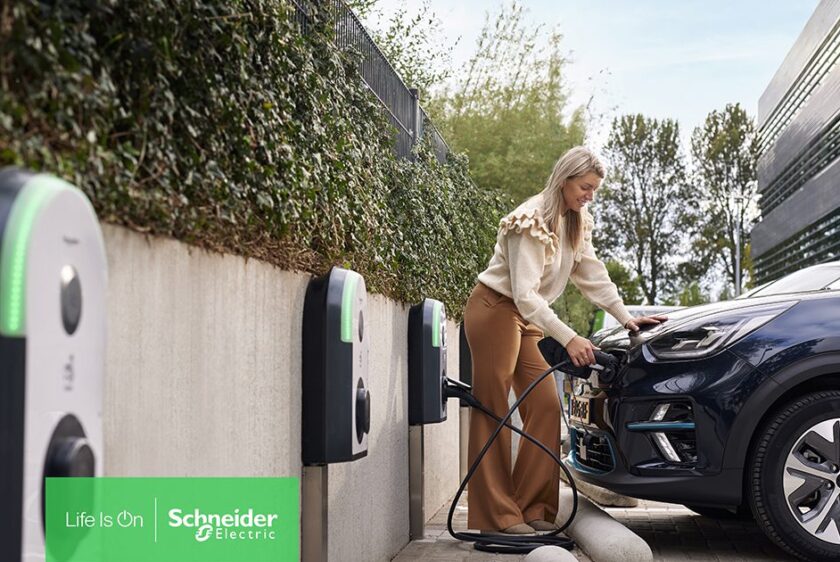This audio was created using Microsoft Azure Speech Services
What is the Alternative Fuels Infrastructure Regulation (AFIR)?
The European Union aims to reduce transportation-related greenhouse gas emissions by 90% by 2050. To meet this goal, electric vehicle adoption will need to grow significantly. The Alternative Fuels Infrastructure Regulation (AFIR), a cornerstone of the EU’s Fit for 55 package, plays an important role in supporting EV adoption by ensuring there is a comprehensive charging infrastructure in place to meet EV charging needs.
AFIR requires EU member states to increase their number of recharging and refueling stations and to standardize EV charging technologies. The new regulation also ensures that EV drivers can easily and conveniently pay for charging using payment types that are widely available in Europe. It gives EV drivers the right to charge their EVs at a public EV charging station without registering or entering into a contract with an operator or mobility service provider (ad-hoc basis).
AFIR requires CPOs to simplify EV charging point payment options
These requirements are creating new challenges for charge point operators (CPOs), who will need to comply with the new regulation.
CPOs must provide full transparency into the price of EV drivers’ charging sessions at public charging points, including any fees that may be applied (e.g. kWh fees). The prices must be clearly communicated and easily available to drivers.
CPOs must also allow EV drivers to pay for their charging sessions using multiple payment options. To accept electronic payments, at least one of the following payment options must be available:
- Payment card readers
- Devices with a contactless functionality that can read payment cards
- Devices using an internet connection and allowing for secure payment transactions, via QR codes for example.
The payment requirements differ based on charge points’ power output.
For charge points below < 50 kW
· Operator must provide ad-hoc payment to charge without any contract-based recharging and use at least one of the three above-mentioned payment options.
· Operator must be transparent about pricing, providing price per kWh, by minute, and/or per session. For example, provide the price in a manner that is clearly and easily available to the charge point end-user, through electronic means. A display is not mandatory.
For charge points above 50 kW
· Operator must provide ad-hoc payment to charge without any contract-based recharging and use at least the first or the second payment options, mentioned above. Payment via QR code is excluded.
· The ad-hoc price must be based on a price per kWh (+ potential fee per minute to discourage long occupancy)
· Operator must be transparent about pricing and display it in a convenient manner to the end user, either on-screen or via a sticker at the recharging station.
CPOs’ payment technology solutions must comply with AFIR’s requirements
Under AFIR, the charge point operator is responsible for ensuring that EV drivers can charge using ad-hoc payments.
To meet the requirements, CPOs must work with payment terminal providers and payment services providers (PSP) to process and collect EV drivers’ payments made on the payment terminal. PSP will help process the financial transactions, while payment terminal manufacturers will provide tools to manage payment terminals and maximize reliability.
CPOs benefit from using cloud architectures that link the payment solution directly to the operator backend (charging station management system (CSMS) platform). This approach provides many advantages, including that the integration effort only needs be done once and becomes available for all EV chargers that are already integrated in the operator backend (CSMS platform). The pricing policy can be dynamically modified and displayed on the payment terminal screen.
Using a cloud architecture, existing EV charging installations can be quickly retrofitted by installing the payment kiosk. Retrofitting does not require any charging station modifications. Using a payment kiosk helps reduce the overall cost of the payment solution because one payment terminal can be used for multiple charging stations or dedicated to a charging cluster.
The use of payment terminals improves security and offers a streamlined user experience thanks to contactless payment.
When making a technology choice, CPOs’ should consider their specific needs
When choosing the best solution for AFIR compliance, CPOs should closely consider their needs.
- Do they need a payment terminal that is integrated into an existing external kiosk or should they choose a charging station with the payment reader directly embedded?
- Are their installations a combination of AC and DC charging stations or DC only?
- How many charging stations do they have?
- Can their Charging Station Management System (CSMS) support the operation of payment terminals
Here are two types of payment terminal solutions that meet the requirements:
Payment terminal integrated into an external kiosk: Charge point operators can meet AFIR requirements by using a payment terminal that is integrated into an external kiosk. The payment terminal is only used to authorize payments, but does not charge EVs. This is a good option for installations that have a mix of AC and DC charging stations: one payment terminal solution can be used for multiple charging stations, which reduces the overall cost of the payment solution.
Charging station with embedded credit card reader: Charge point operators can also use an all-in-one solution, which uses the same device to authorize payments and charge a vehicle. This eliminates the need for an external kiosk solution and is optimal for frequent use of the charging station (turnover of less than 1 hour) to enhance customers’ experience.
Learn more about technology solutions that can help CPOs meet AFIR requirements
Watch this how-to video to learn how CPOs can install and commission an ad-hoc payment kiosk solution that is flexible, compatible with multiple charge points, and compliant with Alternative Fuels Infrastructure Regulation (AFIR). The solution can easily be integrated in a new or existing EV infrastructure and includes a charging station management system.
CPOs can also contact Schneider Electric experts to learn more about the AFIR-compliant solutions that best fit their payment technology needs.
About the author

Anthony Song, Head of New Energy Business
Anthony (Jiong) Song, SVP, Head of New Energy Business, Schneider Electric, is responsible for strategic planning, product development, marketing, and sales management of the company’s new energy business in Europe, Southeast Asia, Oceania, South America, the Middle East and Africa to accelerate the expansion of Schneider’s new energy business.



